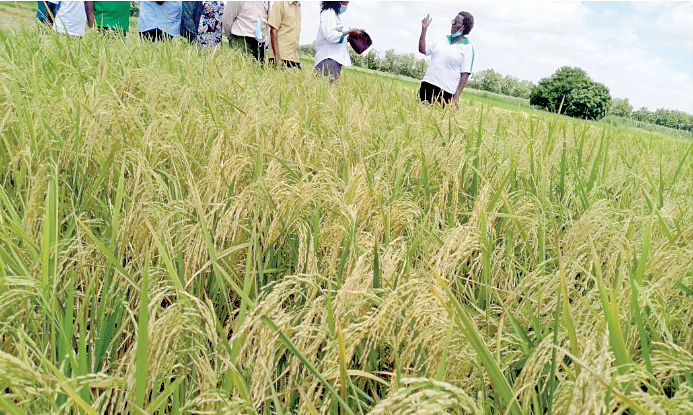Wheat farmers face crisis over row with millers

Wheat farmers are facing potential financial ruin as large-scale millers dilly-dally in purchasing their produce.
Failure to purchase locally-produced wheat stock has left hundreds of smallholder farmers holding 321,000 bags of wheat and mounting debts.
This is despite the directive by Agriculture Cabinet Secretary Mutahi Kagwe that National Cereals and Produce Board (NCPB) collect the wheat from farmers starting March 4. As at end of last week, Agriculture and Food Authority (AFA) director general Bruno Linyiru confirmed that 7,200 bags of wheat had been delivered to NCPB by farmers.
According to NCPB acting Managing director Samuel Karogo, farner’s will receive their proceeds after the same has been paid for by the millers.
“NCPB is receiving wheat on behalf of the millers. Once millers pay for the quantity they collect, the money will be deposited to a special account and thereafter farmers will be paid. The farmers will be paid between 14 and 21 days after millers pay the amount,” he said.
Large-scale millers under their umbrella body – Cereal Millers Association (CMA) have been forced to refute recent media reports that they have prioritised imports over local wheat to the detriment of the farmers. However, Narok Wheat Farmers Association last week stated that there is no data indicating millers have bought wheat from small growers.
The association chairman Stanley Koonyo confirmed that all locally produced wheat is stored by aggregators warehouses and at farm granaries.
“No farmer or aggregator can confirm to have sold wheat produced in 2024 to the millers. What they (millers) have in their warehouses is not locally produced wheat,” he said while addressing media at the Narok NCPB warehouses.
Koonyo warned that the delay by large-scale millers to purchase local produce will threaten small-scale farmers’ financial stability as majority had borrowed money from local financial intermediaries to finance farming. “If local produce is not purchased smallholder farmers will face difficulties in meeting their financial obligations and equally to large extent frustrate food production efforts in the country,” he added.
Nutritious wheat products
But CMA chief executive Paloma Fernandes in a statement to media houses stated that millers remain committed to supporting local wheat farmers while ensuring that 40 million of their consumers access affordable and nutritious wheat products. “The claims that millers prioritise imports over local wheat are unfounded and misleading. The data clearly shows that millers have purchased nearly all available local wheat, with imports being essential to bridge the country’s wheat deficit,” said Paroma.
While millers across the East African region pay a 10 per cent duty on imported wheat, only Kenyan millers are required to pay premium prices to local farmers before being allowed to import.
Kagwe urged all farmers to deliver their wheat produce to NCPB stores across the country and the same will be paid at agreed prices. Speaking after meeting farmers and aggregators at Narok NCPB depot recently Linyiru confirmed that available data indicates growers are holding 321,000 bags in their stores.
He said they had instructed all farmers to deliver their produce to all NCPB depots and be paid on agreed prices of Sh5,300 and Sh5,200 for Grade 1 for Grade 2 respectively.
“Equally, the government is vigilant to ensure no imported wheat is delivered to the NCPB stores. Government’s priority is to ensure produce held by local farmers is first bought,” said Linyiru. The national wheat demand stands at 2.2 million to 4 million tonnes annually with local farmers producing about 8 per cent of total consumption while 92 per cent is imported.
Kenya’s annual wheat production was 135,000 tonnes in 2023 against a consumption of 2,200,000 tonnes which has been increasing in the last five years.
The deficit of about 1.9 to 2.2 million tonnes has been filled through imports majorly from Russia, Ukraine and European Union. “The total local wheat harvested from July 2024 to March 2025 is 1,710,358 of 90 kg bags and millers have mopped up 1,388,762 bags from August to date. The total available wheat with farmers and marketing agents is about 321,596 bags, the bulk being in Upper Narok with 130,828 bags. The remaining wheat to be harvested in Upper Narok and Timau 2 is projected at 80,000 bags,” added Linyiru.
In the last eight months, he explained that the total amount of wheat imported reached 1,407,129 MT (15,634,767 bags) against a projected allocation of 3,246,000 MT (36 million bags).
Paroma clarified that over the past two decades, millers have consistently purchased all locally produced wheat at premium prices to support and incentivize production. However, she added Kenya’s wheat output has declined and remains insufficient to meet demand.
National consumption
“The country produces only 7 per cent of its annual requirement—approximately 1.7 million bags (153,000 metric tonnes) —while national consumption stands at 24 million bags (2.1 million tonnes). Additionally, Kenya’s wheat harvest is spread over eight months (July to March), meaning supply is not readily available all at once,” stated Paroma.
Between July 2024 and February 2025, a total of 1,360,607 tonnes of wheat has already been imported. These imports have been approved under the East African Community (EAC) duty remission framework.















